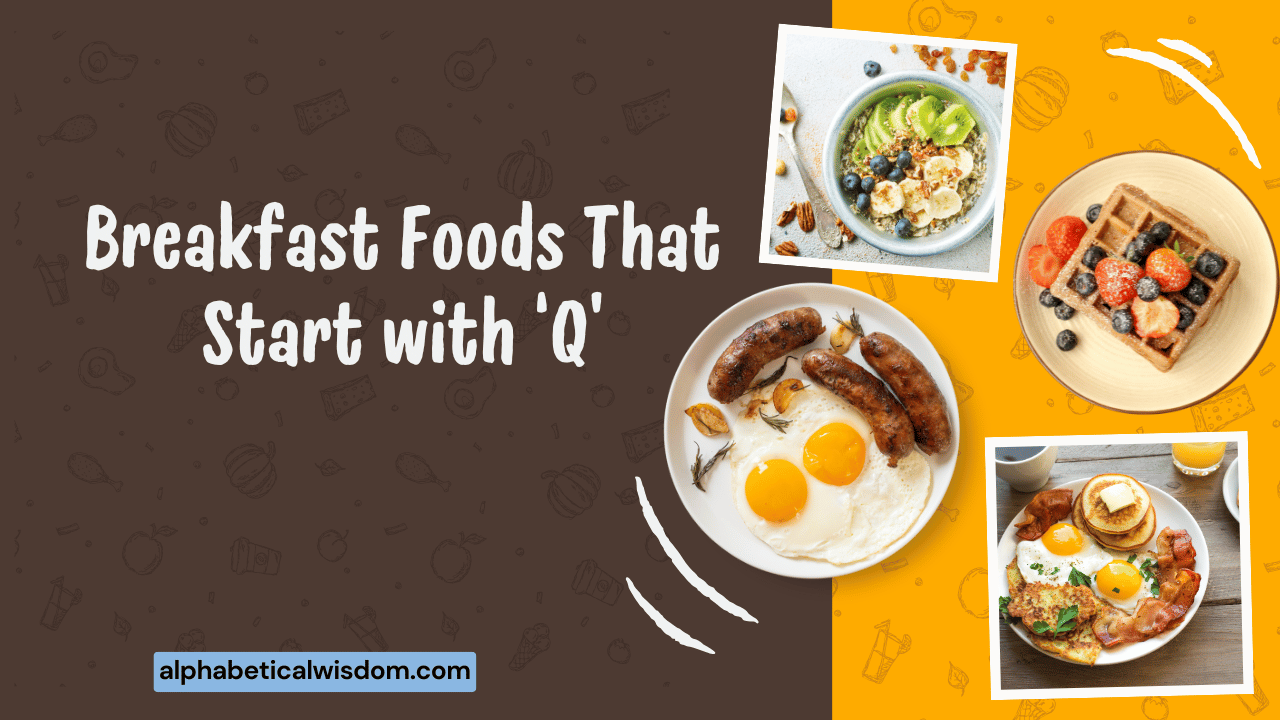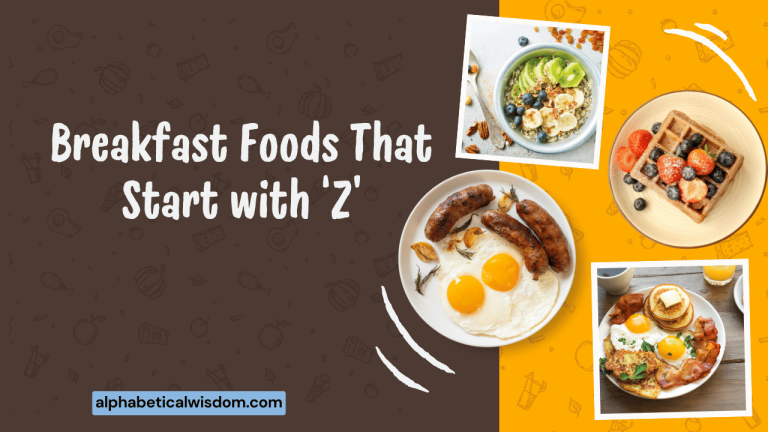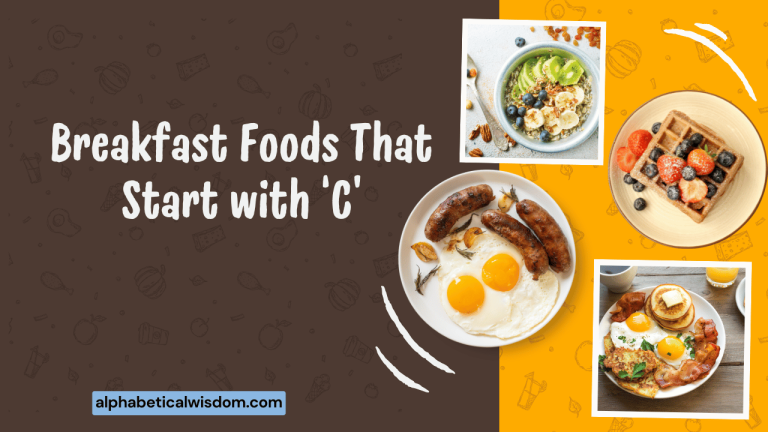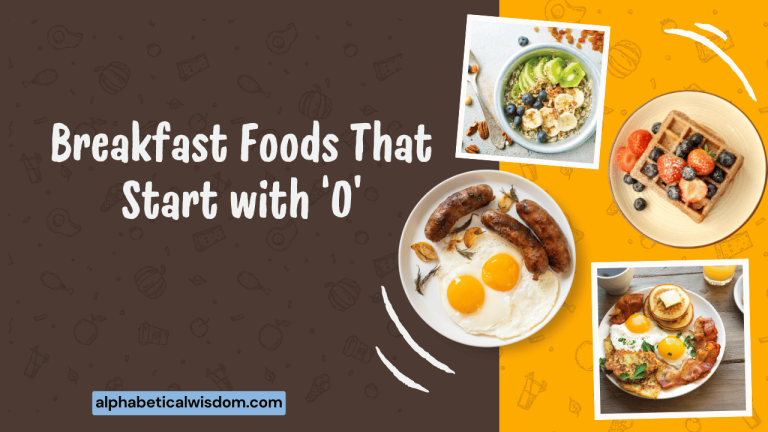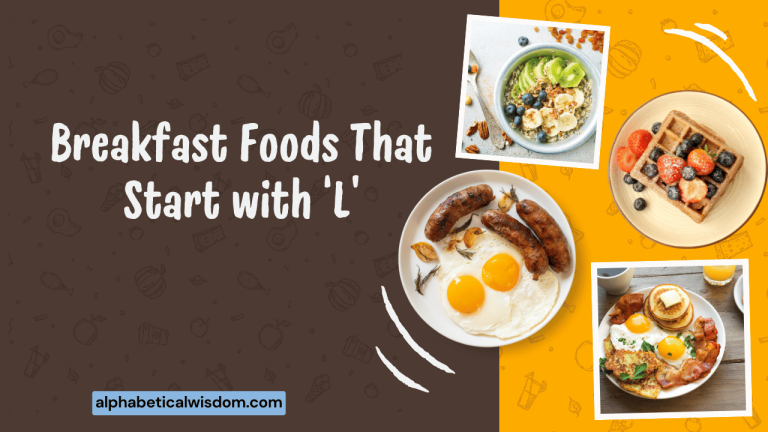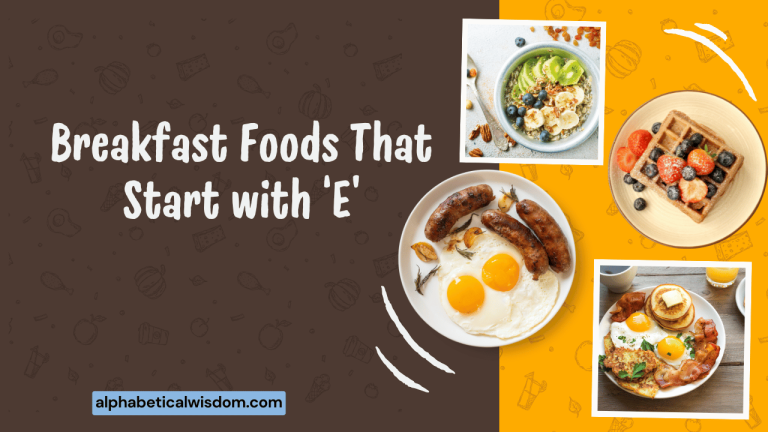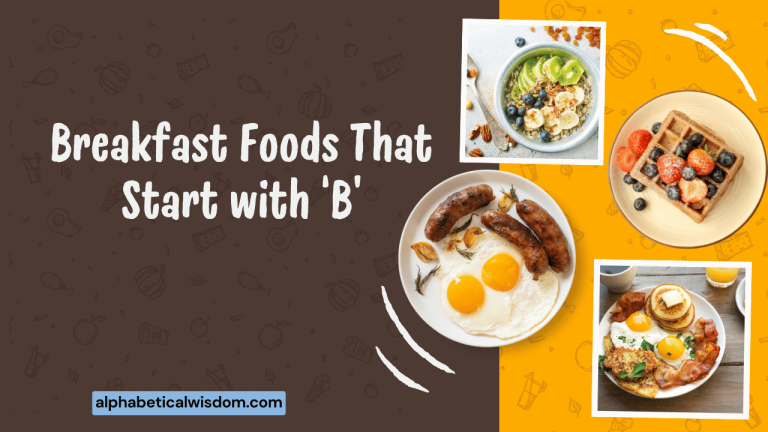Breakfast Foods That Start With Q: A Grammatical Exploration
Exploring the English language through the lens of breakfast foods that start with the letter “Q” might seem quirky, but it offers a unique way to understand grammar. This article delves into the grammatical aspects associated with these foods, focusing on noun classification, usage in sentences, and common errors.
Understanding these nuances is beneficial for English language learners, food enthusiasts, and anyone looking to expand their vocabulary and grammatical skills in an engaging context.
Table of Contents
- Introduction
- Definition of Breakfast Foods Starting with ‘Q’
- Structural Breakdown: Noun Types
- Types and Categories
- Examples of Breakfast Foods Starting with ‘Q’ in Sentences
- Usage Rules
- Common Mistakes
- Practice Exercises
- Advanced Topics
- FAQ
- Conclusion
Definition of Breakfast Foods Starting with ‘Q’
When we talk about breakfast foods starting with the letter “Q,” our options are limited but grammatically insightful. The primary focus is often on variations of quinoa, a grain that can be prepared in numerous ways for breakfast. While “Q” isn’t a common initial letter for breakfast items, exploring quinoa allows us to delve into the grammar surrounding nouns, specifically countable and uncountable nouns, and their impact on sentence structure.
Quinoa itself functions as an uncountable noun when referring to the grain in general. This means we typically don’t say “a quinoa” or “quinoas.” Instead, we use quantifiers like “some quinoa” or “a bowl of quinoa.” However, “quinoa flakes” or “quinoa cereal” become countable because we are now referring to specific processed forms of the grain. Understanding this distinction is crucial for accurate grammar.
Structural Breakdown: Noun Types
The word “quinoa” can function differently based on how it’s used in a sentence. Let’s break down its structural elements:
- Uncountable Noun (Mass Noun): When referring to the grain itself, quinoa is uncountable. It describes a substance that cannot be easily divided into separate units.
- Countable Noun (with modifications): When referring to specific preparations of quinoa, such as “quinoa flakes” or “quinoa puffs,” it becomes countable.
- Subject: Quinoa can act as the subject of a sentence, such as “Quinoa is a healthy breakfast option.”
- Object: Quinoa can also be the object of a verb, such as “I eat quinoa for breakfast.”
Understanding these roles helps in constructing grammatically correct and varied sentences. The key is to recognize whether you’re referring to the general substance or a specific, measurable form of it.
Types and Categories
While the options are limited, we can categorize breakfast foods involving “Q” primarily around quinoa and its variations:
Quinoa-Based Breakfasts
- Plain Quinoa: Cooked quinoa served as a simple breakfast dish.
- Quinoa Porridge: Quinoa cooked with milk or water, often sweetened with fruits or honey.
- Quinoa Flakes: Processed quinoa pressed into flakes, similar to oatmeal.
- Quinoa Cereal: Quinoa used as an ingredient in breakfast cereals.
- Quinoa Pancakes: Pancakes made with quinoa flour or cooked quinoa.
- Quinoa Breakfast Bowls: Bowls containing quinoa mixed with fruits, nuts, and seeds.
Each of these categories allows for grammatical variations. For example, “I had plain quinoa for breakfast” uses “quinoa” as an uncountable noun with an adjective. “I ate quinoa pancakes” uses “pancakes” as a countable noun modified by “quinoa.”
Examples of Breakfast Foods Starting with ‘Q’ in Sentences
Let’s explore how these breakfast foods are used in sentences, focusing on grammatical accuracy and variety.
Table 1: Quinoa as an Uncountable Noun
This table illustrates how “quinoa” is used as an uncountable noun in different sentence structures. Notice the use of quantifiers and articles.
| Sentence | Grammatical Notes |
|---|---|
| I eat quinoa for breakfast every morning. | “Quinoa” is the direct object, uncountable, no article needed. |
| Quinoa is a great source of protein. | “Quinoa” is the subject, uncountable, no article needed. |
| Do you want some quinoa? | “Quinoa” is the object of the preposition, uncountable, quantified by “some.” |
| She prefers quinoa over oatmeal. | “Quinoa” is the object of the verb, uncountable, no article needed. |
| We need more quinoa for the recipe. | “Quinoa” is the object, uncountable, quantified by “more.” |
| Is there any quinoa left? | “Quinoa” is the subject complement, uncountable, quantified by “any.” |
| He bought quinoa at the farmer’s market. | “Quinoa” is the object of the verb, uncountable, no article needed. |
| The doctor recommended quinoa for its health benefits. | “Quinoa” is the object of the verb, uncountable, no article needed. |
| I am trying to incorporate more quinoa into my diet. | “Quinoa” is the object of the preposition, uncountable, no article needed. |
| Quinoa can be cooked in various ways. | “Quinoa” is the subject, uncountable, no article needed. |
| She sprinkled quinoa on her salad. | “Quinoa” is the object of the verb, uncountable, no article needed. |
| They offer quinoa as a side dish. | “Quinoa” is the object of the verb, uncountable, no article needed. |
| I find quinoa to be quite versatile. | “Quinoa” is the object of the verb, uncountable, no article needed. |
| Quinoa is often used in vegetarian dishes. | “Quinoa” is the subject, uncountable, no article needed. |
| We should buy quinoa in bulk to save money. | “Quinoa” is the object of the verb, uncountable, no article needed. |
| He added quinoa to the soup for extra protein. | “Quinoa” is the object of the preposition, uncountable, no article needed. |
| Quinoa is naturally gluten-free. | “Quinoa” is the subject, uncountable, no article needed. |
| She learned how to cook quinoa perfectly. | “Quinoa” is the object of the verb, uncountable, no article needed. |
| They serve quinoa with roasted vegetables. | “Quinoa” is the object of the verb, uncountable, no article needed. |
| I prefer to rinse quinoa before cooking it. | “Quinoa” is the object of the verb, uncountable, no article needed. |
| The recipe calls for one cup of quinoa. | “Quinoa” is the object of the preposition, uncountable, quantified by “one cup.” |
| She uses quinoa as a substitute for rice. | “Quinoa” is the object of the verb, uncountable, no article needed. |
| Quinoa is a complete protein source. | “Quinoa” is the subject, uncountable, no article needed. |
| I seasoned the quinoa with herbs and spices. | “Quinoa” is the object of the verb, uncountable, no article needed. |
| They sell organic quinoa at that store. | “Quinoa” is the object of the verb, uncountable, no article needed. |
Table 2: Quinoa-Based Dishes as Countable Nouns (Plural)
This table illustrates the use of quinoa-based dishes, where the dishes themselves are countable. The focus shifts to the preparations rather than the grain itself.
| Sentence | Grammatical Notes |
|---|---|
| I made quinoa pancakes for breakfast. | “Pancakes” is countable, modified by “quinoa.” |
| She enjoys quinoa flakes with almond milk. | “Flakes” is countable, modified by “quinoa.” |
| We tried some delicious quinoa breakfast bowls. | “Bowls” is countable, modified by “quinoa.” |
| Are those quinoa muffins you baked? | “Muffins” is countable, modified by “quinoa.” |
| He bought several boxes of quinoa cereal. | “Cereal” can be countable here (boxes), modified by “quinoa.” |
| There are many variations of quinoa salads. | “Salads” is countable, modified by “quinoa.” |
| She prepared quinoa burgers for the brunch. | “Burgers” is countable, modified by “quinoa.” |
| They sell different kinds of quinoa bars at the health store. | “Bars” is countable, modified by “quinoa.” |
| I love to experiment with quinoa recipes. | “Recipes” is countable, modified by “quinoa.” |
| These quinoa cookies are delicious and healthy. | “Cookies” is countable, modified by “quinoa.” |
| She made quinoa fritters for the party. | “Fritters” is countable, modified by “quinoa.” |
| They offer different flavors of quinoa chips. | “Chips” is countable, modified by “quinoa.” |
| I packed quinoa crackers for the hike. | “Crackers” is countable, modified by “quinoa.” |
| She added quinoa croquettes to the menu. | “Croquettes” is countable, modified by “quinoa.” |
| They sell quinoa donuts at the bakery. | “Donuts” is countable, modified by “quinoa.” |
| I made quinoa waffles for Sunday brunch. | “Waffles” is countable, modified by “quinoa.” |
| She served quinoa rolls with the meal. | “Rolls” is countable, modified by “quinoa.” |
| They have quinoa patties on the grill. | “Patties” is countable, modified by “quinoa.” |
| I baked quinoa scones this morning. | “Scones” is countable, modified by “quinoa.” |
| She prepared quinoa wraps for lunch. | “Wraps” is countable, modified by “quinoa.” |
| They offer quinoa tacos on Tuesdays. | “Tacos” is countable, modified by “quinoa.” |
| I made quinoa crepes with fruit filling. | “Crepes” is countable, modified by “quinoa.” |
| She baked quinoa biscuits for the picnic. | “Biscuits” is countable, modified by “quinoa.” |
| They serve quinoa dumplings at the festival. | “Dumplings” is countable, modified by “quinoa.” |
| I bought quinoa pretzels at the store. | “Pretzels” is countable, modified by “quinoa.” |
Table 3: Quinoa as an Adjective
In this table, “quinoa” is used as an adjective, modifying the noun that represents the breakfast food. This is common when describing the ingredients of a dish.
| Sentence | Grammatical Notes |
|---|---|
| I added quinoa flour to the pancake mix. | “Quinoa” modifies “flour,” acting as an adjective. |
| She made a quinoa salad with fresh vegetables. | “Quinoa” modifies “salad,” acting as an adjective. |
| He prefers quinoa porridge with berries. | “Quinoa” modifies “porridge,” acting as an adjective. |
| The quinoa cereal is very nutritious. | “Quinoa” modifies “cereal,” acting as an adjective. |
| We tried a new quinoa bread recipe. | “Quinoa” modifies “bread,” acting as an adjective. |
| She prepared a quinoa stuffing for the turkey. | “Quinoa” modifies “stuffing,” acting as an adjective. |
| They served a quinoa pilaf at the wedding. | “Quinoa” modifies “pilaf,” acting as an adjective. |
| I made a quinoa crust for the pizza. | “Quinoa” modifies “crust,” acting as an adjective. |
| She added quinoa flakes to her smoothie. | “Quinoa” modifies “flakes,” acting as an adjective. |
| They baked quinoa muffins for the bake sale. | “Quinoa” modifies “muffins,” acting as an adjective. |
| I seasoned the quinoa soup with herbs. | “Quinoa” modifies “soup,” acting as an adjective. |
| She prepared quinoa burgers for the barbecue. | “Quinoa” modifies “burgers,” acting as an adjective. |
| They offer quinoa pasta at the restaurant. | “Quinoa” modifies “pasta,” acting as an adjective. |
| I tried a quinoa risotto at the Italian restaurant. | “Quinoa” modifies “risotto,” acting as an adjective. |
| She added quinoa seeds to her yogurt. | “Quinoa” modifies “seeds,” acting as an adjective. |
| They cooked quinoa stew for the winter. | “Quinoa” modifies “stew,” acting as an adjective. |
| I mixed quinoa sprouts into the salad. | “Quinoa” modifies “sprouts,” acting as an adjective. |
| She made a quinoa tortilla for lunch. | “Quinoa” modifies “tortilla,” acting as an adjective. |
| They prepared quinoa gnocchi for the dinner party. | “Quinoa” modifies “gnocchi,” acting as an adjective. |
| I added quinoa granules to the recipe. | “Quinoa” modifies “granules,” acting as an adjective. |
| She cooked quinoa couscous for the meal. | “Quinoa” modifies “couscous,” acting as an adjective. |
| They baked quinoa brownies for the dessert. | “Quinoa” modifies “brownies,” acting as an adjective. |
| I made quinoa falafel for the vegetarian dish. | “Quinoa” modifies “falafel,” acting as an adjective. |
| She added quinoa flakes to her morning oatmeal. | “Quinoa” modifies “flakes,” acting as an adjective. |
| They prepared quinoa croquettes for the appetizer. | “Quinoa” modifies “croquettes,” acting as an adjective. |
Usage Rules
Understanding the usage rules for “quinoa” and related terms is essential for correct grammar:
- Uncountable Noun Rule: Use “quinoa” without an article (a/an/the) when referring to the grain in general.
- Quantifiers: Use quantifiers like “some,” “more,” “a lot of,” or “a bit of” with uncountable “quinoa.”
- Countable Noun Rule: When referring to specific preparations, use articles (a/an/the) or plural forms (e.g., “quinoa pancakes,” “a quinoa muffin”).
- Adjective Usage: When “quinoa” modifies another noun, it usually precedes the noun (e.g., “quinoa salad”).
Exception: In some contexts, “quinoa” can be used as a countable noun to refer to different varieties of quinoa, but this is less common in the context of breakfast foods. For instance, “There are several different quinoas available at the market.”
Common Mistakes
Here are some common mistakes to avoid when using “quinoa” in sentences:
| Incorrect | Correct | Explanation |
|---|---|---|
| I ate a quinoa for breakfast. | I ate quinoa for breakfast. | “Quinoa” is uncountable, so no article is needed. |
| I want two quinoas. | I want two servings of quinoa. | “Quinoa” itself is uncountable; use “servings” to quantify it. |
| The quinoa pancake was delicious. | The quinoa pancakes were delicious. | If referring to multiple pancakes, use the plural form. |
| More quinoa are needed. | More quinoa is needed. | Uncountable nouns take singular verbs. |
| Quinoa is taste good. | Quinoa tastes good. | Correct subject-verb agreement with a singular, uncountable noun. |
| I like the quinoas. | I like quinoa. | Unless referring to specific types, avoid the article and plural form. |
| She cooked a plain quinoa. | She cooked plain quinoa. | “Quinoa” is uncountable, so no article is needed. |
Practice Exercises
Test your understanding with these practice exercises. Fill in the blanks with the correct form of “quinoa” or related words.
Exercise 1: Uncountable vs. Countable
Choose the correct form of “quinoa” to complete each sentence.
| Question | Answer |
|---|---|
| 1. I need to buy some ______ at the store. | quinoa |
| 2. She made delicious ______ for breakfast. (quinoa pancakes) | quinoa pancakes |
| 3. ______ is a healthy grain. | Quinoa |
| 4. Are those ______ you baked? (quinoa muffins) | quinoa muffins |
| 5. He added ______ to the soup. | quinoa |
| 6. We tried the new ______ at the cafe. (quinoa bowl) | quinoa bowl |
| 7. ______ can be cooked in many ways. | Quinoa |
| 8. I prefer ______ with almond milk. (quinoa flakes) | quinoa flakes |
| 9. She sprinkled ______ on her salad. | quinoa |
| 10. These ______ are gluten-free. (quinoa cookies) | quinoa cookies |
Exercise 2: Sentence Correction
Correct the following sentences that contain errors in the use of “quinoa.”
| Question | Answer |
|---|---|
| 1. I want a quinoa for lunch. | I want quinoa for lunch. |
| 2. She likes the quinoas very much. | She likes quinoa very much. |
| 3. More quinoa are needed for the recipe. | More quinoa is needed for the recipe. |
| 4. He ate a quinoa pancake. | He ate a quinoa pancake. (If only one pancake) or He ate quinoa pancakes. (If multiple) |
| 5. The quinoas is very nutritious. | Quinoa is very nutritious. |
| 6. I bought two quinoas. | I bought two servings of quinoa. |
| 7. She cooked a plain quinoa for dinner. | She cooked plain quinoa for dinner. |
| 8. Quinoa are good for you. | Quinoa is good for you. |
| 9. He is eating a bowl of quinoas. | He is eating a bowl of quinoa. |
| 10. I prefer the quinoa rather than rice. | I prefer quinoa rather than rice. |
Exercise 3: Fill in the Blanks (Advanced)
Complete the sentences with appropriate quantifiers or articles to correctly use “quinoa.”
| Question | Answer |
|---|---|
| 1. I need ______ more ______ to finish the dish. | a little, quinoa |
| 2. She added ______ ______ of ______ to the salad. | a handful, quinoa |
| 3. There is not ______ ______ left in the pot. | much, quinoa |
| 4. He ate ______ ______ of ______ with berries. | a bowl, quinoa |
| 5. We need to buy ______ ______ of ______ for the week. | a bag, quinoa |
| 6. She used ______ ______ as a substitute for rice. | quinoa |
| 7. They served ______ ______ at the restaurant. | quinoa |
| 8. I prefer ______ ______ over oatmeal for breakfast. | quinoa |
| 9. The recipe calls for ______ ______ of ______. | a cup, quinoa |
| 10. She sprinkled ______ ______ on her avocado toast. | quinoa |
Advanced Topics
For advanced learners, consider these more complex aspects:
- Figurative Language: Explore how “quinoa” might be used metaphorically in writing.
- Cultural Context: Investigate the cultural significance of quinoa and its impact on language.
- Compound Nouns: Analyze the formation and grammar of compound nouns involving “quinoa” (e.g., “quinoa-based diet”).
Delving into these areas provides a deeper understanding of the nuances of how “quinoa” functions within the English language and beyond. It encourages a more nuanced and sophisticated use of the word in both writing and speech.
FAQ
- Is “quinoa” a countable or uncountable noun?
Generally, “quinoa” is an uncountable noun when referring to the grain itself. However, it can be considered countable when referring to specific preparations or dishes made with quinoa, such as “quinoa pancakes” or “quinoa salads.”
- Do I need to use an article (a/an/the) before “quinoa”?
No, you typically don’t use an article before “quinoa” when referring to the grain in general. For example, you would say “I eat quinoa,” not “I eat a quinoa.” However, when referring to a specific dish, like “a quinoa salad,” an article is appropriate.
- What quantifiers can I use with “quinoa”?
You can use quantifiers like “some,” “more,” “a lot of,” “a little,” or measurements like “a cup of” with “quinoa.” For instance, “I want some quinoa” or “I need a cup of quinoa.”
- Can “quinoa” be used as an adjective?
Yes, “quinoa” can be used as an adjective to describe other nouns. For example, “quinoa salad” or “quinoa flour.” In these cases, “quinoa” modifies the noun that follows it.
- Is it correct to say “quinoas”?
While less common, “quinoas” can be used to refer to different varieties of quinoa. However, in the context of breakfast foods, it’s more typical to use “quinoa” as an uncountable noun.
- How do I use “quinoa” in a sentence as the subject?
You can use “quinoa” as the subject of a sentence by saying something like “Quinoa is a healthy food” or “Quinoa is easy to cook.”
- What is the correct verb form to use with “quinoa”?
Since “quinoa” is generally uncountable, use a singular verb form. For example, “Quinoa is” rather than “Quinoa are.”
- Are there any common misspellings of “quinoa” I should be aware of?
Yes, common misspellings include “quinoa,” “quinua,” and “quinoia.” Always double-check the spelling to ensure accuracy.
- Can I use ‘the’ before quinoa?
Using ‘the’ before quinoa is generally not necessary unless you are referring to a specific batch or instance of quinoa that has already been mentioned. For example, “The quinoa I cooked last night was delicious.” Otherwise, use quinoa without ‘the’ for general references.
- How do I correct sentences with incorrect usage of “quinoa”?
Identify whether “quinoa” is meant to be uncountable or if you’re referring to a specific dish. Adjust the sentence to remove unnecessary articles or to use appropriate quantifiers. For example, change “I want a quinoa” to “I want quinoa” or “I want a bowl of quinoa.”
Conclusion
Understanding the grammatical nuances surrounding breakfast foods, even those starting with less common letters like “Q,” can significantly enhance your English language skills. By focusing on “quinoa,” we’ve explored the distinctions between countable and uncountable nouns, adjective usage, and common errors to avoid.
This focused approach not only expands your vocabulary but also reinforces fundamental grammar principles.
Remember to practice using “quinoa” in various sentence structures and contexts to solidify your understanding. Pay attention to quantifiers, articles, and verb agreement to ensure accuracy.
With consistent practice, you’ll confidently navigate the grammar of even the most unusual breakfast-related vocabulary, improving your overall command of the English language.
